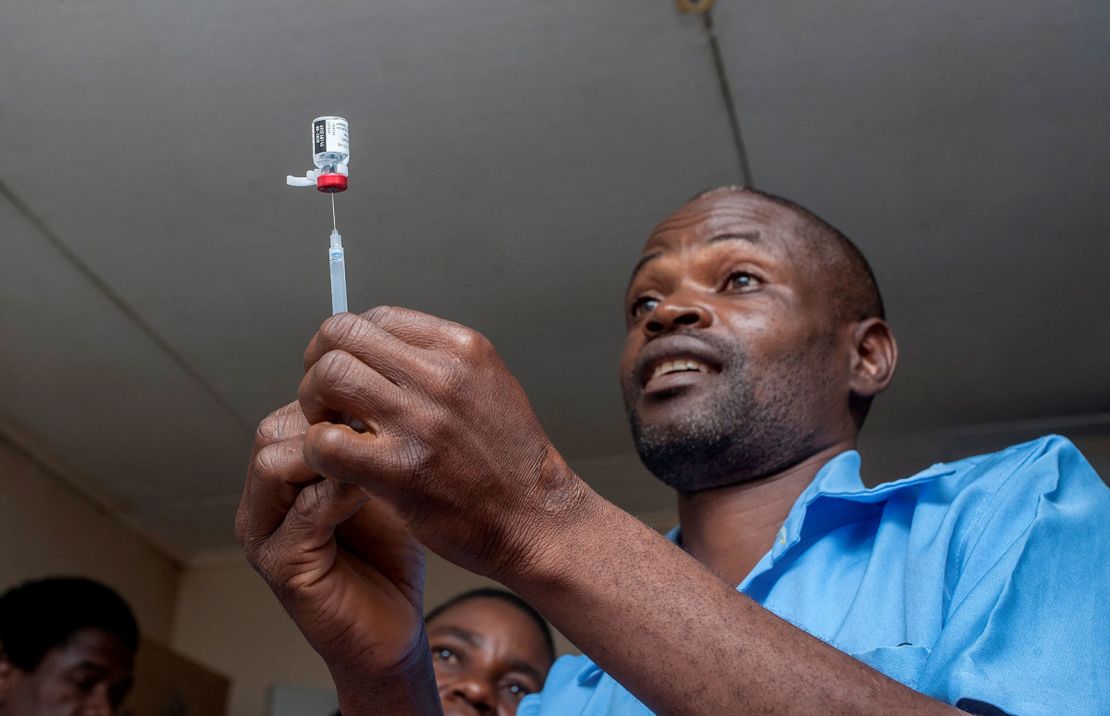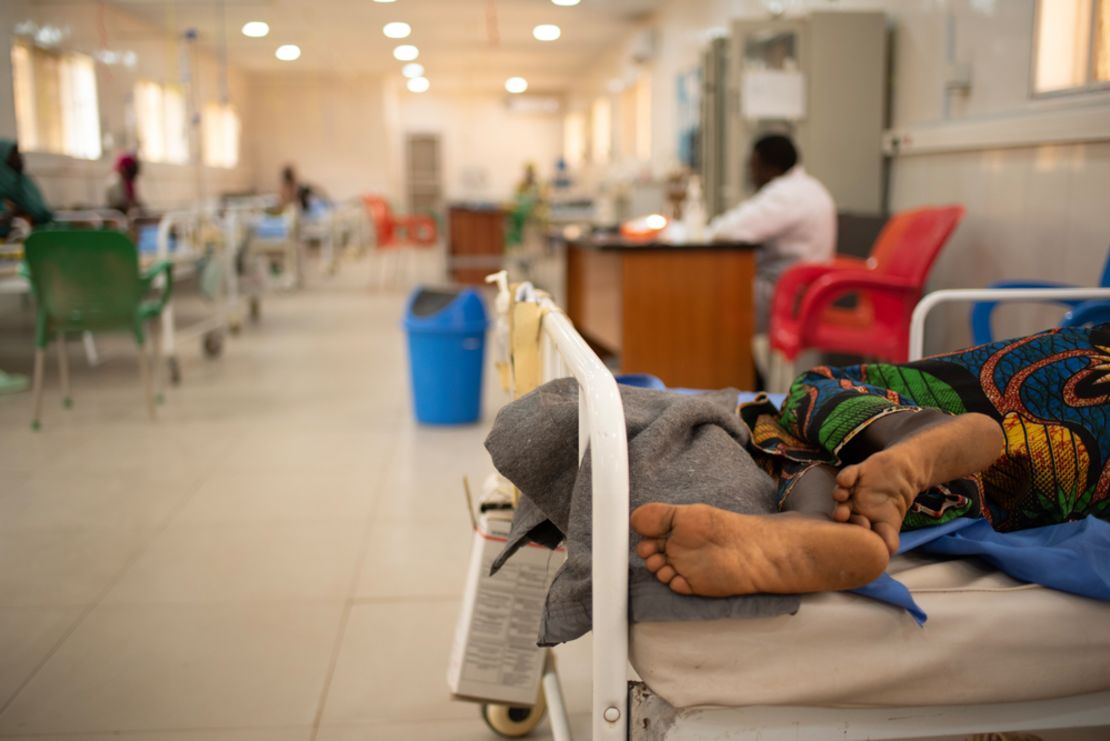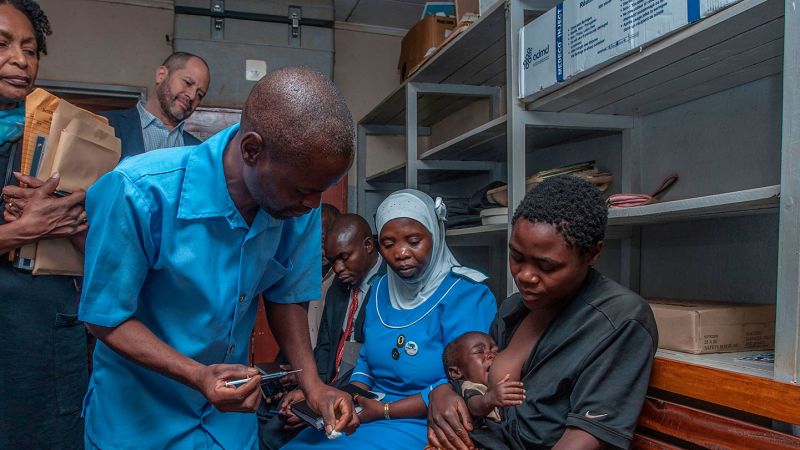Abuja, Nigeria
CNN
—
Cuts to US-funded malaria programs are adding to a host of issues confronting Congolese mother Mwayuma Idi Feza, whose city, Goma, is at the center of the country’s intensifying conflict and run by a vicious militia.
“I have a child who is sick. He has had malaria for a week and a few days now,” Feza, 36, told CNN of her 1-year-old son, whose fever she suspects is caused by the mosquito-borne illness.
She is also experiencing symptoms of the disease, she said. “I’m feeling cold. I feel bitterness in my mouth.” The single mother is out of work and said she can barely afford food, much less malaria treatment for her and her baby.
Malaria is a preventable and curable disease, but it still claims hundreds of thousands of lives around the world each year. Infants, children under five and pregnant women are most likely to die from a malaria infection.
It’s a leading cause of death in the Democratic Republic of Congo (DRC), which bears the world’s second-highest malaria burden after Nigeria, according to the World Health Organization (WHO). In 2022, some 24,000 people were estimated to have died of the disease in the central African nation. More than half those deaths were of children under 5.
Since the Trump administration started slashing foreign aid early this year, an estimated 36% of US Agency for International Development (USAID) funding for malaria programs has been cut, according to the Center for Global Development, a DC-based think tank. But the true level of aid cuts remains uncertain.
In the DRC, that money funded the supply of antimalarials to “many health zones” across the country, “including intermittent preventive treatment for pregnant women,” according to Michel Itabu, a former spokesperson for the country’s National Malaria Control Program (PNLP), referring to a WHO-recommended program in areas where malaria is endemic.
“The PNLP is already feeling the effects” of the funding cuts, Itabu told CNN. Such preventive programs might have protected Idi Feza and her baby son – instead, if infected, they are both at risk of serious illness or even death.
The US government has long been the largest donor to global efforts to combat malaria. For decades, USAID spearheaded a program called the President’s Malaria Initiative (PMI) to drive down mortality and eliminate malaria in 30 of the hardest-hit nations, most of which are in Africa. Launched by George W. Bush in 2005, the program helped reduce malaria deaths by more than 60% – saving millions of lives.
CNN spoke to several people who previously worked on the initiative but were recently laid off amid Trump’s dismantling of USAID. Most PMI staff have been let go or had their work halted by stop-work orders, and the Trump administration’s proposed budget called for a 47% cut to the program.
“One of the reasons that we don’t have malaria in the US is because we fund and track malaria worldwide, for global health security.”
Former USAID contractor, speaking anonymously for fear of reprisals
Every aid worker who spoke to CNN emphasized that people would die in the short term as a result of the disruption to malaria prevention and treatment efforts.
Longer term, they said the funding cuts would destroy years of American progress in driving down the prevalence and severity of the disease.
US-backed surveillance systems that were once the backbone of efforts to monitor malaria and other disease outbreaks around the world have also been cut, former US government workers told CNN, underscoring long-term concerns.
“One of the reasons that we don’t have malaria in the US is because we fund and track malaria worldwide, for global health security,” one former USAID contractor told CNN in February, speaking anonymously for fear of reprisals. She warned that locally acquired malaria cases, like Florida experienced in 2023, could become more common “if we’re not funding driving down the parasite elsewhere.”
Aid workers and nonprofits have repeatedly made the case that malaria programs and US disease monitoring make America “safer, stronger and more prosperous,” which was Secretary of State Marco Rubio’s stated framework for assessing US foreign assistance.
For example, USAID and the US military have long invested in malaria vaccine research to both reduce the global disease burden and protect US soldiers serving abroad.
Spencer Knoll, US policy and advocacy director at the nonprofit Malaria No More, said in testimony to the US House Appropriations Subcommittee in April that “the world’s most dangerous infectious diseases – including Ebola, Marburg, and pandemic influenza – often present first as fevers, and malaria detection programs can stop outbreaks in their tracks.”
The nonprofit also argued that US assistance prevents other countries like China and Iran from making further inroads in Africa in terms of soft power.
“Everything that comes from USAID… was very intentionally branded, with this logo that says ‘from the American people.’ People know where it was coming from,” said former PMI contractor Annē Linn, who lost her job in January. “When all of a sudden everything stops, that just tears down trust – not just from our government to other governments, but within countries’ own health systems.”
Between 2010 and 2023, the US contributed more than one-third of the world’s malaria financing, according to WHO.
As of last year, the US was also the largest contributor to the Global Fund, which works to fight AIDS, tuberculosis and malaria. It’s unclear what the future level of US funding for the independent, public-private program will be, following the Trump administration’s proposal to halve US matching contributions.
The Trump administration’s funding cuts “could reverse decades of progress earned, in part, through longstanding investments from the United States of America and other global partners,” WHO warned in a statement earlier this year. “Although funding for some USA-supported malaria programs have been reinstated, the disruptions have left critical gaps.”
A State Department spokesperson told CNN that “PMI life-saving programs are continuing in partner countries… Life-saving malaria activities are not under stop work orders.” The department is also “preparing a contribution to the Global Fund, which we’re working with them to finalize,” according to the spokesperson.
“Consistent with Secretary Rubio’s statements, continuing foreign assistance programs advance the core national interests of the United States, including providing emergency assistance in conflict zones and supporting key American strategic partners,” the spokesperson added.
Former aid workers emphasized concerns about lack of investment to tackle several global threats related to malaria, including drug resistance, increasingly insecticide-resistant mosquitoes and new, invasive types of mosquitoes that are moving into urban areas with high populations.
“The timing for all of this couldn’t be worse. Malaria is seasonal, and so having interruptions during times of seasonality sets us back significantly,” said Nathaniel Moller, formerly a senior innovation adviser at the PMI, whose job was cut in January. He warned that with less funding for measures like bed nets and preventative medicine, the baseline of cases will rise this year, enabling further spread of the disease down the road.
“You missed that window, and you can’t just go back to that initial baseline… it’s going to go up,” Moller said, noting that the rainy season is already underway in parts of east, central and southern Africa. “We risk losing years of investments and seeing the caseload increase significantly.”
That bad timing is particularly evident in Malawi, where recent flooding and cyclones have driven up malaria infections, the country’s National Malaria Control Manager Lumbani Munthali told CNN. He added that cuts to USAID funding for malaria interventions have put the country in “a difficult situation” because “it’s not easy to close the gaps that have been created.”

More than 2,000 people died of malaria in Malawi last year. Some 9 million were infected.
“Malawi has made significant progress in reducing malaria deaths because of the technical and financial support from the US government,” Munthali said. That funding went towards procuring millions of malaria tests kits annually and providing insecticide-treated bed nets and antimalarial medication for pregnant women and nursing mothers.
“We are trying to close those gaps but may not close them completely,” Munthali said, as Malawi adjusts to the sharp drop-off in US foreign aid. About 64% of Malawi’s USAID funding has been cut across all programs, according to the Center for Global Development’s analysis.
In 2023, the most recent year for which PMI figures are available, Malawi received $24 million for its fight against malaria. It’s not yet clear exactly how much it will lose this year, Munthali said.
Cuts to other areas of US foreign aid, like malnutrition programs, will have overlapping effects in Africa, aid workers also warned.
“Kids that are acutely malnourished will be more vulnerable to other diseases,” like measles, cholera and malaria, according to Nicolas Mouly, an emergency coordinator for Doctors Without Borders, or Médecins Sans Frontières (MSF), who works in northwest Nigeria. He said funding gaps for malnutrition programs that were already present in 2024 have deepened significantly this year.
Malaria infection can also lead to malnutrition, fueling what MSF has called “a vicious cycle.”

Nigeria’s health minister, Muhammad Ali Pate, told CNN that the government has mobilized domestic funding for its health sector, including $200 million recently approved by parliament to lessen the effects of losing USAID funding.
“When the change in US government occurred and the policy was made, we considered it as another opportunity for reset and for us to increase our domestic funding so that we can meet the responsibility of the health of our population,” he said. “At the end of the day, the responsibility of the health of Nigerians is on the Nigerian government. It is never a primary responsibility of the US government.”
MSF doesn’t rely on US government funding, but the organization said its programs have been burdened with additional patients following US cuts to other humanitarian actors in the region. “We won’t have the capacity to treat all of them,” Mouly said.
Aid organizations prepare for the annual peak of malnutrition – when fall harvests have yet to arrive and rainy seasons have increased malaria cases – by stockpiling ready-to-use therapeutic food sachets. But for this year’s lean season, Mouly said there is “uncertainty” about their availability.
“We can expect a very critical situation,” Mouly said, emphasizing that children will die as a result. “We’ve not seen anything like this in terms of disruption of global aid. It’s very difficult.”


